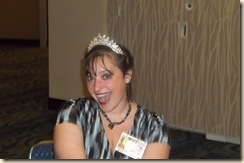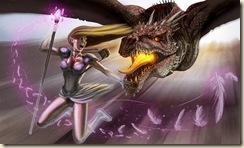"Exodus Tides" grew out of several conversations at last year's Eastercon about immigration: both about society's acceptance of massive influx of migrants, and of how migrants themselves dealt with leaving the homeland behind, and starting a new life in a foreign country. In many ways, it's about the experience of the second generation, who has no link to the homeland beyond the stories of the older generation, and who has to adapt from childhood to an environment that might not be kind, or welcoming. For Emilie, of course, there is the extra layer of being a mixed-blood, stuck between two worlds--which isn't always a simple thing.
More than anything else, I intended the story to be about the  problematic relationship of migrants and their descendants to the homeland: the sense of nostalgia that's inevitable, and also a little misleading--for the land that is remembered might have no connection at all with the land the way it is now, especially if fifteen or twenty years have passed, and things abroad have moved on. The stories that are told to Emilie push this notion to the edge: instead of a real homeland, what she has are myths and fairytales, which come both from a desire to protect her, and from her mother's own nostalgia for the lost country (which, in this case, is very literally lost). It's very much a story about the cost of lies--they might help a small child, but when they run their course, the revelation causes a painful shock, with repercussions that might not have been thought out.
problematic relationship of migrants and their descendants to the homeland: the sense of nostalgia that's inevitable, and also a little misleading--for the land that is remembered might have no connection at all with the land the way it is now, especially if fifteen or twenty years have passed, and things abroad have moved on. The stories that are told to Emilie push this notion to the edge: instead of a real homeland, what she has are myths and fairytales, which come both from a desire to protect her, and from her mother's own nostalgia for the lost country (which, in this case, is very literally lost). It's very much a story about the cost of lies--they might help a small child, but when they run their course, the revelation causes a painful shock, with repercussions that might not have been thought out.
Unlike other stories, this one came to me in bits and pieces: I usually write chronologically, but this story actually started with the swimming pool scene and the strong image of the completely "Frenchified" mother picking up her conflicted daughter. The other scenes were gradually filled in afterwards, still without coherent order (I think the ending was pretty the second thing that came to me, for instance). The story also developed fast, with extra scenes filled in partly from a sense of what the story needed, and partly using the French headlines of the time, which were about "problems" caused by migrants (in reality, by rootless second-generations, who are actually French citizens by right of soil). The character of Jamila came from this last, and also from a need to have a foil for Emilie: someone also struggling with her own cultural identity, and her own family stories, which might or might not be true. The holidays in Brittany are also a mainstay of French culture (it's generally either that, or going to the beach on the French Riviera), and I had a lot of fun putting familiar settings to work for the story.
Another fun tidbit was working out character names for the mermen: I chose a pattern frequently used by Asian immigrants, which was to take a "safe", non-adventurous name in order not to stand out. Thus, every merman in the story has an old-fashioned French name--broadly speaking, they're a generation late, using names that suit, but are hardly cutting-edge.
When I submitted the story to Edmund at IGMS, he kindly pointed out that the ending as it was did not work: it dumped too much information on the reader in one go, and left Emilie no time to come to a decision of her own before the reader could work through their confusion. Accordingly, I moved some information upwards,, to have the reveal come gradually. The original ending turned out not to work so well after the new reveal, so I had to tweak it slightly in order to keep the effect. I kept it ambiguous, deliberately: I have my own opinion on what Emilie does, but it's a tough problem, and I can easily put forth arguments for one decision or another.
The big question a lot of you might be asking is how much of the story reflects my own experience. Mostly, I'm not saying--gotta keep some things to myself, after all. But remember: I'm a writer. I tell plausible lies for a living.
--Aliette de Bodard






